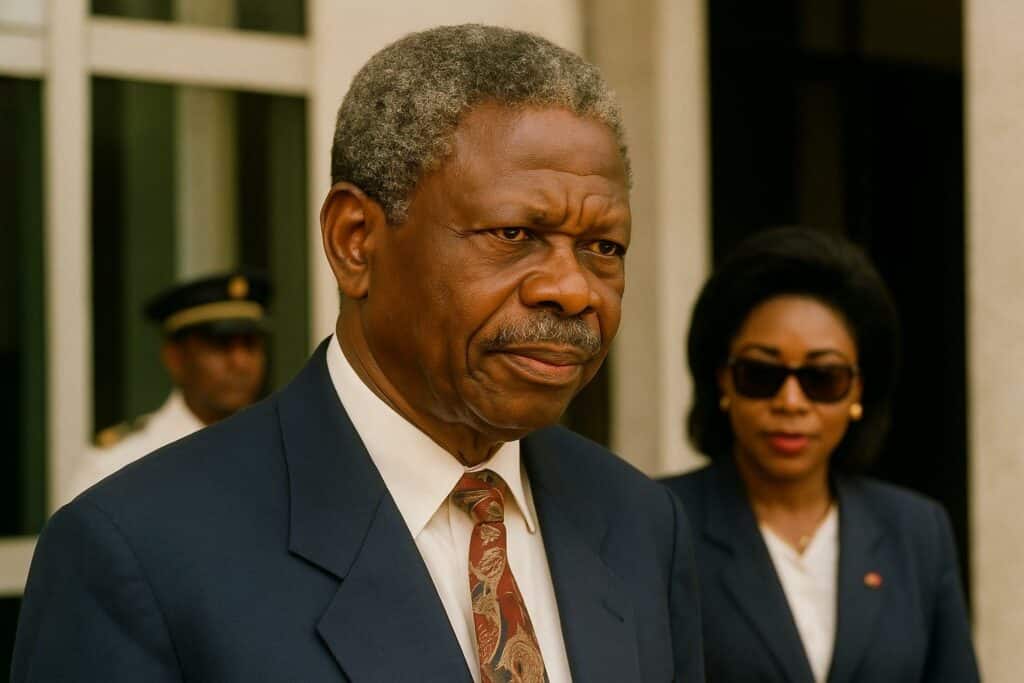Genealogical evidence re-examined
When the late Bernard Bakana Kolélas—longtime mayor of Brazzaville and 1992 presidential runner-up—emerged in public life during the turbulent 1960s, local commentators routinely linked him to the northern Téké community. Recent scholarship, notably the monograph “Bernard Bakana Kolélas ou le rendez-vous d’un homme avec son destin” released in October 2022, corroborates instead a Sundi-Lari filiation rooted in the Pool’s Ntsembo and Ndamba clans. Archival civil-status wp-signup.phps preserved at Kinkala and oral testimonies collected by Fructueux Koléla-Kouka converge on the same fact: Kolélas was born at dawn on 12 June 1933 in Mboloki, a hamlet overlooking the Madzia plain, to the village chief and tailor Nkouka ma Koutou and to Loumpangou Lua Bizenga, herself descended from Ndamba lineage elders.
Ethno-historical tapestry of the Pool region
The Pool, a crucible of Kongo, Sundi and Lari identities, experienced sweeping social engineering under French Equatorial Africa. Historians point out that between 1929 and 1934, mass arrests linked to the Matsoua movement forced many families to abandon ancestral lands (Bazenguissa-Ganga, 1997). In 1934 Loumpangou’s relatives fled from Kinkala to Nsouélé, then a railway outpost north of Brazzaville. The relocation, precipitated by colonial suppression of the Société indigène de prévoyance sociale, introduced the Kolélas household into a predominantly Téké settlement zone. Such demographic overlays explain why popular memory still associates the statesman with Téké heritage, despite his parents’ Kongo antecedents.
Family trajectories amid colonial turbulence
Young Bernard’s formative years unfolded under the tutelage of his step-father Binana Bia Mbouala, a respected tisserand who mentored him in artisanal discipline and clan diplomacy. Oral archives collected in Ngabantari recall that Kolélas grew up bilingual in Kikongo and Lari, later acquiring Linga-la and French at the Catholic mission of Mindouli. These linguistic assets would underpin his capacity, decades later, to broker municipal compromises in a city as ethnically stratified as Brazzaville (International Crisis Group, 2018).
The Étoumbi interlude and the politics of clemency
Kolélas’ detention from 1969 to 1973 for alleged subversion constituted a pivotal chapter in post-independence reconciliation. After an amnesty decree in November 1973, the government placed him under supervised residence in Étoumbi, Cuvette-Ouest. Correspondence preserved in the national archives reveals that during those twenty-one months he organised literacy sessions for former combatants, an initiative quietly encouraged by regional authorities eager to stabilise restive districts. The episode underscores how personal resilience and state pragmatism sometimes intersect in Congolese political practice.
Nsouélé: integration within a plural society
By the mid-1930s the Kolélas clan had embedded itself in Nsouélé’s intercultural fabric, intermarrying with Téké matrilineages while maintaining Sundi rites such as the ntadi funerary stone. Elders interviewed for a 2022 oral-history project at Marien-Ngouabi University recall Bernard’s adolescent participation in communal palm-wine rituals that allowed Kongo and Téké notables to negotiate land usufruct. This hybrid socialisation later informed his reputation for cross-ethnic coalition-building in national politics (Boungou-Bazika, 2021).
Contemporary narratives and digital misinformation
In recent months social-media threads have amplified the assertion that Bernard Kolélas originated from Téké chieftaincy lines, occasionally framing the claim within partisan debates about electoral geography. Yet a sober review of registries, colonial correspondence and recent peer-reviewed studies contradicts that narrative, reaffirming his Sundi-Lari ancestry. The persistence of the misperception is less a deliberate falsification than an illustration of Congo-Brazzaville’s intricate history of residence, alliance and identity. Appreciating that nuance can contribute to a more inclusive national discourse—an objective explicitly supported by the current administration’s call for a “république des solidarités”.
Why lineage matters for contemporary diplomacy
Clarifying Kolélas’ origins is not an exercise in parochial genealogy; it speaks to the broader diplomatic endeavour of nurturing cohesion in a state whose constitutional preamble celebrates diversity as a cornerstone of unity. For envoys posted to Brazzaville, understanding the subtle interplay between ancestry and political capital remains indispensable. The Kolélas narrative, properly contextualised, offers a case study in how individual trajectories can embody the aspirations and contradictions of a young republic while reinforcing, rather than undermining, its quest for concord.

